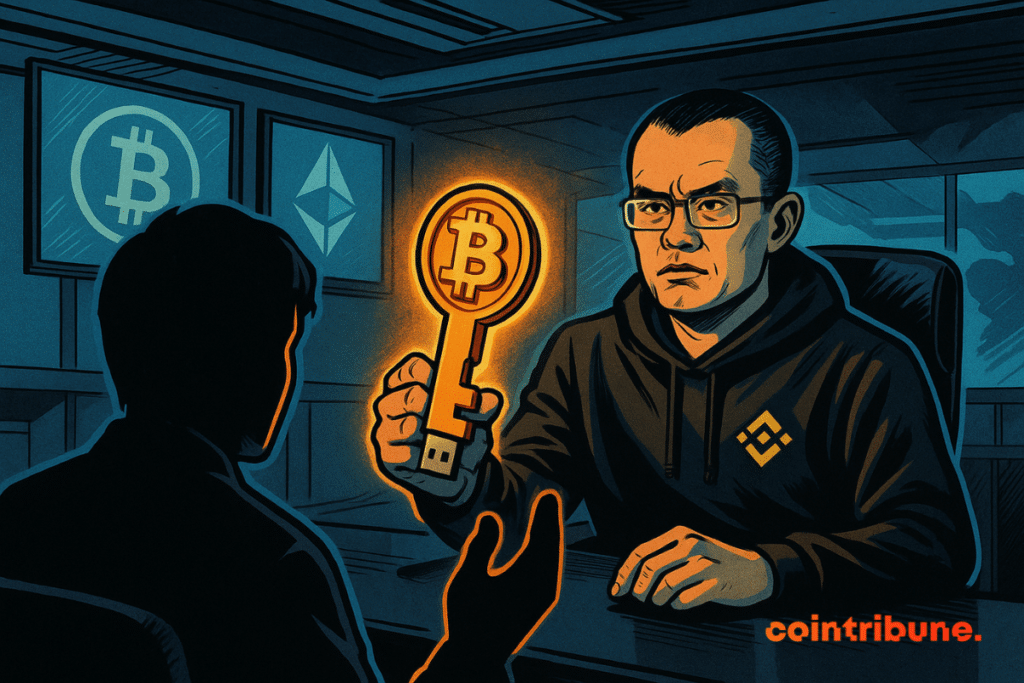Changpeng Zhao’s Vision: Why Every Crypto User Needs a ’Death Switch’ Feature
Forget inheritance lawyers—Binance's founder wants your private keys to outlive you. Changpeng Zhao's latest push? A failsafe mechanism letting crypto holders designate heirs for their digital fortunes. No more Bitcoin lost to the blockchain abyss.
How it works: Users set up encrypted 'dead man's switches' that auto-transfer assets if they go inactive. Think of it as a smart contract meets last will and testament—minus the probate court delays.
The irony? Traditional finance spent decades building estate planning systems. Crypto just bulldozed them with 50 lines of code. (Take that, wealth management advisors charging 2% AUM.)
Zhao's betting this feature becomes as standard as two-factor authentication. Because in decentralized finance, even ghosts need seed phrases.

In brief
- More than one billion dollars in crypto are lost each year due to the absence of a designated heir.
- Binance launches an inheritance feature allowing to alert a contact after long inactivity.
- CZ advocates for a universal standard to transfer crypto according to predefined proportions.
- The community warns about the intangible value of Web3 accounts, which are difficult to transfer today.
Orphan Crypto: When Assets Disappear with Their Holders
Every year,. The number is chilling. Unlike traditional money, it’s impossible to contact a banker or provide a death certificate to unlock a wallet. Without the, your digital assets become inaccessible memories.
In a post published on X, CZ summarizes the urgency:
This is a topic people avoid, but the fact is, humans cannot live forever yet. Every platform should have a ‘will function’.
The idea? To allow users towith a predefined share distribution.
This functionality,It allows, paving the way for an inheritance request.
But this advance does not solve everything. @Uniswap12, an active Binance user, expressed a more subtle reservation: “My Binance account contains essential intangible assets, like my posts, my 72,000 followers. For me, that’s worth more than money.”
Testamentary function: towards a new Web3 standard?
What CZ proposes goes. He sketches a, where death is no longer a black hole but a passage point. By integrating a, platforms not only respond to a moral necessity: they establish a FORM of continuity, almost heritage-like, in an ecosystem known for its volatility.
For @Binn1190, this evolution is:
Banks rarely release the assets of the deceased. Knowing that our values can be passed on strengthens trust.
At the same time,so they can be beneficiaries without necessarily trading. A measure that still needs regulation but opens the debate.
But this intention clashes with. In the United States, crypto assets are considered personal property, comparable to furniture or shares. It is therefore impossible to apply traditional mechanisms of life insurance or bank accounts. In case of death without a will, the state inheritance law applies, but.
The solution? A twofold approach: a classic will accompanied by technical instructions, kept secured. Never write your keys in the will itself, as it becomes public during the probate process.
Crypto inheritance: what happens to our digital identities?
Digital death goes beyond wealth. The question today is: what becomes of your crypto “self”? Your followers, your SBT tokens, your wallet-linked IDs are not just assets. They are your trace, your Web3 footprint.
@Uniswap12 rightly warns about this intangible value. His Binance account, like others, is much more than a wallet. It’s, a space of recognition. He calls for a solution inspired by telephone operators:.
But Web3, by its very design, relies on non-transferable links. The “Soulbound Token” is precisely made to. How to inherit what cannot be divided or assigned? The debate is open.
Some figures speak for themselves:
- More than 1 billion $ in unclaimed crypto annually after unexpected deaths;
- 72,000 followers on @Uniswap12’s Binance account, an example of intangible influence;
- Average age of crypto holders: 27 to 42 years;
- Binance launched its “will function” on June 12, 2025;
- Crypto is not covered by traditional banking inheritance mechanisms.
Preparing the transfer of bitcoins and cryptos is a real challenge. Reflections have existed for several years, especially on the transfer of bitcoins after death. Technical and legal avenues have been proposed. But nothing replaces a collective awareness.
Maximize your Cointribune experience with our "Read to Earn" program! For every article you read, earn points and access exclusive rewards. Sign up now and start earning benefits.

